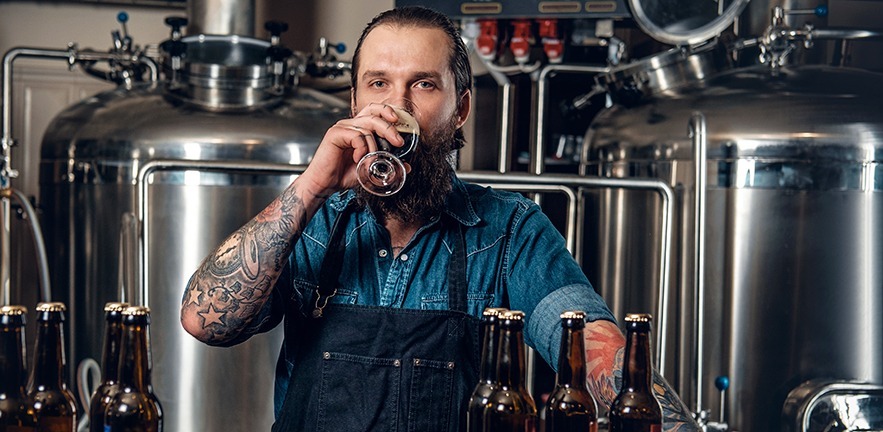By Dr Jochem Kroezen, University Lecturer in International Business at Cambridge Judge Business School, with co-authors Dr Maikel Kuijpers, Assistant Professor of the Archaeology of Early Europe at Leiden University, and Dr Catalin Popa, Postdoctoral Researcher in Archaeology at Leiden University


Our economy currently relies heavily on unsustainable industrial principles of mass scale, never-ending growth and throwaway consumerism. The transition to a sustainable economy, then, requires a shift in how we think about production.
In contrast to industrial production, craft production prioritises local production, human skill and excellence. Although craft principles were cast aside as industries were modernised, a revival is taking place. Examples of craft revival are visible in many sectors, ranging from butchering to textile production, but one of the most illustrative examples comes from the booming craft beer sector.
In the Netherlands, about 1,000 breweries existed at the beginning of the 19th century. Following the industrial revolution, there was a dramatic switch to the mass production of one beer style: pilsner. Only 13 breweries, all now using industrial principles of production, remained by 1980 and 90 per cent of the market was controlled by the four largest players. But since then, a revival of craft production has fuelled a dramatic resurgence of the brewery population. Today, there are well over 300 breweries again.
The Netherlands is not the only country where craft brewing has been revived. In 11 of the biggest beer producing nations, the number of breweries has grown by a factor of five in recent decades. If we exclude Belgium and Germany, where industrialisation had less of an effect on the traditional brewing population, the factor is even greater: 23. The US brewing population, for instance, grew from a mere 89 craft breweries in 1978 to well over 6,000 today.
Challenges
Part of this dramatic craft renaissance is explained by a change in demand. Fuelled by nostalgia and an anti-mass production sentiment, the market demand for local, authentic products is growing, most notably in the food industry.
Yet demand does not change in isolation. It requires producers that are willing and able to follow alternative production principles and educate consumers. A recent study of the Dutch beer brewing industry found that the increasing success of the craft movement was in large part driven by a growing and eclectic group of beer enthusiasts that devoted themselves to becoming brew masters, regenerated craft brewing techniques and revived a declining industry in the process. The craft beer revival shows that a transition away from unsustainable, industrial production is possible and desirable.
But these crafty change-makers face challenges. The main issue for any incipient craft movement is to shake off the idea that craft is an outdated mode of production, strictly adhering to historic methods and recipes.
The craft beer revolution, for example, was not possible in places such as Germany and Belgium, which have maintained historic beer brewing traditions. There, breweries tend to strictly follow narrow interpretations of what traditional craft production means and have expectations about how and where craft skill should be applied, such as following age-old community specific recipes. This conception of “craft” constrains innovation – and indeed both countries lack the rich innovative craft brewing scene that has developed elsewhere.
Successful craft movements, on the other hand, smartly harness the power of localism, authenticity and nostalgia without getting stuck in the past. This attitude was clearly expressed by one Dutch brewer:
I have always been bothered by the false romanticism that beer lovers like to hear and the ordinary reality of beer brewing. Beer brewing is a craft. You write your own recipes. There is no such thing as old recipes. All beers that were brewed 100 years ago are disgusting.
This is an extreme opinion: generally traditions are navigated more respectfully. Through craft, brewers stress their traditional, independent background while experimenting and making entirely new beers. It’s important to open up the definition of craft and to find a productive balance between tradition and innovation.
Craft-washing
Another challenge for the modern craft movement is the reality that any organisation can be bought. Although initially craft brewers were able to build a separate market for craft beer and resist the lure of big money, incumbent industrial brewers are now taking over successful craft breweries at increasing speed.
In the Netherlands, one of the most successful craft breweries, De Molen in Bodegraven, has recently been acquired by Bavaria, one of the four large incumbent brewers. Bavaria also owns the Dutch abbey brewery, De Koningshoeven, known for its authentic Trappist beer, while Heineken acquired the oldest still running brewery, Brand, in the early 2000s. This signals a new era of consolidation and raises questions about the long-term resilience of the craft movement.
There is more to this than simple reconcentration of market power: businesses are showing an interest in heritage. This is because consumers increasingly look for authenticity. The past delivers an impression of this, shrouded as it is in a mystical aura of nostalgia. Companies therefore use the past as a coat of paint, giving their products an authentic feel. What businesses need, the past provides.
And companies that lack longevity themselves can buy it. New manufacturers regularly purchase older businesses to root their products further into the past, branding their newly bought tradition with slogans such as “since 1820”. For the same reason, companies are buying their way into craft. They capitalise on the market’s growing thirst for authenticity by creating the impression of craft production using savvy advertising. Big business appears to engage in craft-washing. They want the craft brand – but whether they want craft values is another question.
A new economy
This is key – because the practices and values of craftsmanship correspond well with the requirements for a sustainable economy. If we can redefine craftsmanship in a form that is built for the future, instead of being simply a nostalgic eulogy to the past, we can create an economy based on sustainability, durability and excellence.
Craft could provide the means and values for a sustainable society, both socially and environmentally. In the US, the craft beer boom led to a dramatic increase in employment during a time that beer consumption declined. And producing fewer, better, things can have environmental benefits over mass-produced products with inherently short life cycles. Craft skills support important practices of recycling and repairing.
In short, an updated notion of craftsmanship provides the architecture needed for a sustainable, innovative economy. Entrepreneurs of the future are those that redefine our relationship with materials. They are the craftspeople who make beer out of stale bread, leather from leftover fruit or who fashion garments from fish skin.
Whether these craft principles will shape the new economy largely depends on modern corporations truly infusing them into their organisations and going beyond craft-washing. Corporate success is historically based on choices that contradict craft principles, which means that corporations are often at a loss when it comes to meaningfully enacting any of these ideas.
This likely means that a transition has to be sustained from the bottom: in the microbreweries, urban gardens, maker spaces and repair cafes. The people in these spaces are not just making. They are creating the mentality needed for a sustainable economy. We need more makers, not managers.
This article was originally published in The Conversation.

